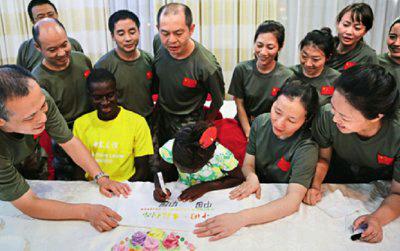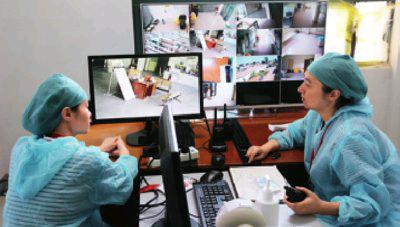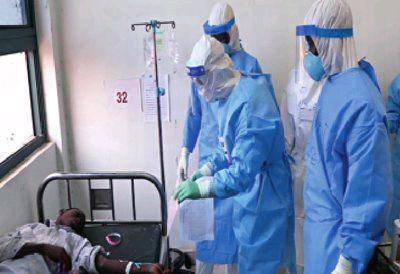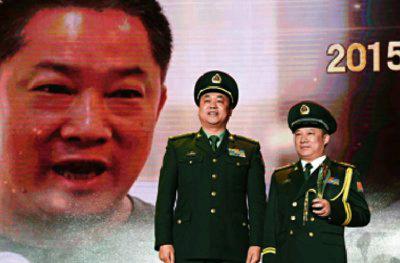Dr. Li Jin, Fighting Ebola on the Frontline
By+staff+reporter+JIAO+FENG
WHEN the Ebola pandemic took hold in West Africa last February, Chinas government took immediate action. It sent around 10 teams of experts and medics to the affected countries, amounting to 1,000 persontimes of epidemic prevention experts and medical workers dispatched. Chinas great contribution to the preven- tion and control of Ebola in Africa and its generous relief to those countries have been highly praised by both local people and the international community.
Dr. Li Jin, deputy president of the 302 Military Hospital of China, was the leader of the medical team sent to Sierra Leone.
On September 12, 2014, Li received the instruction to establish a medical team that would head for Sierra Leone to try to contain Ebola. Four days later, the medical team incorporating a complete organizational system composed of 30 staff members including doctors, nurses, engineers, and logistical support workers, the first of its kind sent abroad by the Chinese Peoples Liberation Army(PLA), was fully formed. Within those four days, the whole hospital was mobilized to prepare medical supplies, protective equipment, and daily necessities for team members. Moreover, despite this tight schedule, time for training had to be found since no one had any experience of dealing with the Ebola virus.
Li admitted he was upset and nervous after getting the order. In his role as head of the medical team, he knew he had the heavy burden of ensuring the safety of every team member. “Its me who will lead them there, so I must bring them back safely. If misfortune befalls any team member, I swear Ill stay with them. I wont come back.” This promise to the team members families might seem over-the-top, but it conveys Lis overwhelming sense of responsibility and the high pressure he was under. He kept his word; all 71 people in the two batches he led to Sierra Leone returned home safely.
On arrival in Freetown, capital of Sierra Leone, Lis team found that the citys infrastructure was poorly developed – there were neither traffic lights nor an underground sewage system. Whats more, in the China-Sierra Leone Friendship Hospital where they were stationed, nearly all medical workers had been scared off due to the death of an Ebola-infected patient. Causing further problems for Lis medical team was the fact that local medical staff were equipped with zero epidemic prevention and control knowledge. “They didnt even know how to correctly use their medical masks or wash their hands methodically. So basically, they had no knowledge or skill in the prevention and control of infectious diseases,” Li said.endprint
In order to receive and treat Ebola patients as soon as possible, according to the requirements of infection control as well as the disinfection and isolation of infectious diseases, Li proposed rearranging the layout of the hospital. In two weeks, the hospital was remodeled into a specialized facility meeting the demands of receiving and curing fulminating infectious diseases. Meanwhile, Lis medical team also conducted comprehensive training of local medical workers, including nurses, pharmacists, and cleaners. The president of the local hospital said that the Chinese medical teams training equipped them with knowledge which would not only be useful for fighting Ebola but also benefit them in the future.
“Since we started to admit patients on October 1, as of November 16, a total of 274 people had been received and treated, 145 of whom were Ebolapositive, and 86 that died. Throughout Sierra Leone, this hospital admits the most patients on a daily basis. Moreover, no medical staff member, either Chinese or local, has ever been infected,” Li said. But ensuring this was no easy feat.
It was found that the public in Sierra Leone were indifferent to Ebola in spite of the large number of reported cases. The warning poster “Ebola is real” was everywhere, yet people still thronged the streets without any protection or awareness of the seriousness of the pandemic. They continued to live in their customary, casual way as if Ebola had never existed. As a fulminating infectious disease, Ebola shows an extremely high rate of infection and death. The local Ebola patients were the most difficult to manage, according to Li. They paid no attention to their doctors suggestions and requirements, and persisted in flocking together and acting at will. Many patients slept, vomited, and relieved themselves anywhere they felt the urge; some even pulled their mattresses out of the ward. Sometimes the medics had to search the hospital compound and grounds for defiant patients to carry out their usual checks and administer medicine. This made it nearly impossible to implement the strict quarantine and disinfection measures.
In addition, there was no centralized management of local medical workers. Their homes were scattered throughout the local communities, where they would participate in worship services, funerals, and other community activities, further increasing the chances of getting infected. Moreover, due to the limited number of beds, ambulances, and drivers at the local treatment center, exacerbated by the frequent strikes of local staff, suspected Ebola patients faced delays in being sent to the observation center. It also delayed the prompt transfer of identified patients to the treatment center, and removal of corpses which often lay in the ward for days. In the worst case, four corpses stayed in a ward for four and a half days before being removed. All these factors multiplied the risk of medical workers becoming infected.endprint

“Our doctors and nurses had to enter wards at least three times a day, each visit lasting around one and a half hours, in direct contact with Ebola sufferers and corpses. We were dancing with death. Meanwhile, our medical team also risked getting other endemic diseases like malaria, cholera, and typhoid fever,” Li told China Today.
Li accordingly took effective and ironhand management measures, introducing a 200-plus-item regulations and working procedures guideline. Close-off management was imposed on the medical team and strict control over the local medical workers, all of whom had to wear thick protective suits, masks, goggles, and shoe covers, despite the muggy climate. After work, they were required to sterilize themselves correctly and remove all 11 protective articles as per a pre-set procedure. Undressing could take as long as 20 minutes. Owing to the rigorous, standard, and responsible medical treatment and management, scores of local Ebola patients lives were saved.
Emma, a patient aged 36, lost her husband, son, daughter, and motherin-law in the raging Ebola plague. After being hospitalized, she refused to be treated. Li said, facing this kind of patient, they couldnt just let them give up. Chinese medical workers tried their best to hearten Emma to find courage to live. When she recovered and was discharged from hospital, she was overcome with emotion. Her eyes filling with tears, she said, “Its so lucky for me that I was treated by these Chinese doctors. Im full of gratitude to the Chinese medical team.”
When 11-month-old baby Lassana and his mother were sent to the diagnosis and treatment center, his mother was identified as an Ebola patient and died three days later. Failing to find his father, the hospital had to send the uninfected Lassana to a local orphanage. However, days later, Ebola spread to the orphanage and Lassana returned to the hospital having contracted the disease. Li and his colleagues attended the baby as carefully as if they were treating their own children. When Li left Sierra Leone, he requested his successor to personally take care of the baby.
Over the past 52 years since China sent its first medical aid team to Africa in 1963, Chinese doctors like Li Jin have promoted development of local medical and health services in the faraway continent, and the overall improvement of local peoples health. Their humanitarian spirit has shown how Chinese people cherish both life and peace, so deepening the friendship between Chinese and African people.
Last March, Li Jin was selected one of the “best doctors dispatched to a foreign country.” endprint
endprint

